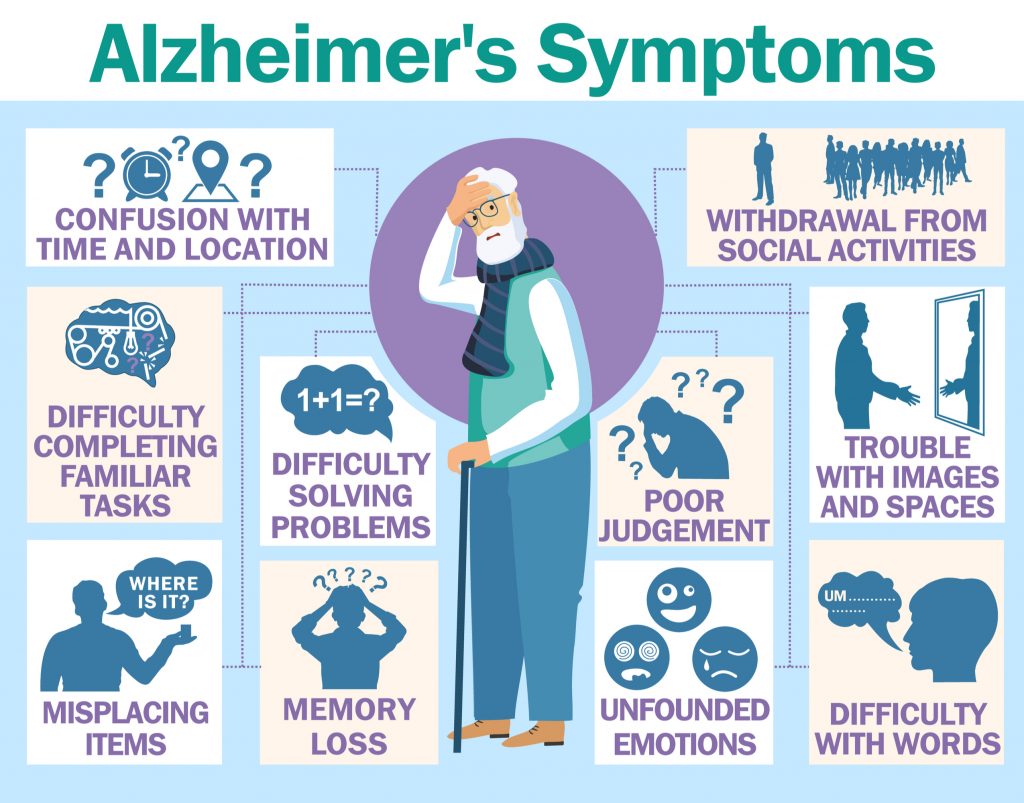Alzheimer’s Disease: Stages and Symptoms

Alzheimer’s disease is a degenerative disorder that largely affects the brain and body in many ways. For instance, the cerebellum shrinks faster than normal aging in Alzheimer’s disease, which results in loss of coordination, balance, equilibrium and muscle tone as well as symptoms like tremors, slurred speech and an inability to judge distance. Yet a shrinking cerebellum is just one of the ways the brain changes due to Alzheimer’s. There are many symptoms, and each one gets worse over time.
Doctors and researchers use seven stages to track the progression of Alzheimer’s:
- Stage One – No impairment — Symptoms of dementia are not evident.
- Stage Two – Very mild decline — May experience minor memory problems or lose things around the house.
- Stage Three – Mild decline — Cognitive problems become more noticeable as it becomes more difficult to find the right words, organize, plan, and remember names.
- Stage Four – Moderate decline — Clear-cut symptoms become apparent as the person loses their ability to manage finances or complete simple arithmetic. The person loses memories from their life history and experiences short-term memory loss.
- Stage Five – Moderately severe decline — The person may help with day-to-day activities such as dressing, but they still maintain a certain amount of functionality. They experience confusion often and find it difficult to recall certain personal details such as their phone number.
- Stage Six – Severe decline — The person now needs constant supervision and possibly professional care. Symptoms include major personality changes, confusion and a need for assistance when it comes to things like bathing or using the toilet.
- Stage Seven – Very severe decline — The person loses their ability to communicate and respond to others. They need assistance with all activities of daily living and lose the ability to swallow. The patient eventually transitions to hospice for end-of-life care, which can be provided in their own home.
Covering the Costs of Alzheimer’s Care
It’s not easy to come to terms with an Alzheimer’s diagnosis. However, it’s important to be realistic about symptom progression and the costs of care. While Medicare may pay medications and ongoing medical care to diagnose and treat Alzheimer’s disease, it does not help with some of the most costly aspects of the disease such as long-term custodial care. Furthermore, there are often unexpected costs such as home renovations that enable the person to remain in their home safely during the earlier stages of Alzheimer’s.
One way for homeowners to cover the cost of care is to take out a home equity loan, which can then be used to pay down medical bills and necessary home modifications. The equity of your home is determined by subtracting the amount you have left to pay on your mortgage from the market value of your house. Many home equity loans are ideal because they have low interest rates, fixed monthly payments, and manageable payback period options.
Another way to cover medical expenses is by investing in a supplemental Medicare plan that covers the costs for things regular Medicare will not. For instance, many Medicare Advantage plans offer the same coverage as Medicare Parts A and B with additional benefits that pay for prescriptions, dental, vision, fitness services, 24/7 nursing hotlines, and even support for caregivers.
When it comes to non-medical costs, family members may need to look into alternative funding options such as a reverse mortgage or selling their loved one’s property for something smaller to free up cash. When looking into reverse mortgages, do your research first and only shop around for reputable companies. Selling off assets or entering a reverse mortgage are big decisions.
Alzheimer’s is a life-changing disease that affects a person’s ability to care for themselves over the years. While many seniors rely on Medicare to cover medical costs, the state-funded insurance does not pay for many of the things an Alzheimer’s patient needs such as long-term custodial care in the later stages. Alternative insurance plans such as Medicare Advantage can take care of some of the gaps when it comes to prescriptions and caregiver support, but families should also look into personal loans to access money for non-medical costs.
How Alzheimer’s Patients Can Benefit From In-Home Care Services
Behavioral changes are a common symptom found in patients with Alzheimer’s. Patients who suffer from this disease can develop depression and/or irritability. Such changes in behavior can make every day living very difficult. A Home Health Aide can help assist in running errands and cleaning, allowing the patient to remain in a familiar environment.
Alpha Senior Home Care provides quality and affordable non-medical care for seniors and home-bound persons in the comfort and convenience of their own home.
Home care services can significantly help seniors with Alzheimer’s by providing assistance for everyday living. These services include:
- Personal grooming services and hygiene care
- Quality interactive companionship
- Meal preparation
- Medication reminders
- Light housekeeping
- Social and recreational activities
- Stimulation and exercise
- Transportation
Alzheimer’s affects over 5 million Americans. As that number continues to grow it is important to know what services are available to you and your loved one. In-Home care can help decrease and eliminate some of the difficulties that Alzheimer’s patients face every day. Call (631) 365-0671 or contact us through this form to see if In-Home care services are right for you or your loved one today.
